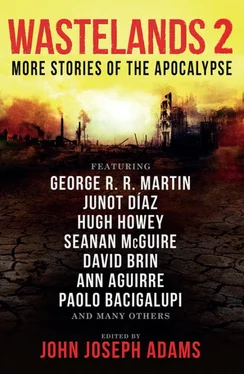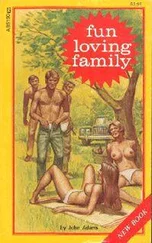And when I was thirteen, they took away the sun. I argued. I sulked. I tried to convince my parents they were overreacting—we didn’t need to go live underground like rabbits, but they were afraid. The streets teemed with people who had been infected with the Metanoia Virus, and public services couldn’t cope with them all. My parents told me these unfortunates were unable to hold a job; their health and mental abilities had been permanently compromised. In time, they promised, the government would help the sick. I wasn’t sure shooting them or rounding them up in trucks counted as help, but I got used to hearing automatic-weapons fire and the rumble of large engines as I fell asleep.
That morning, the bunker company sent an armed escort to take us from our apartment. We put on special clothing and masks that would allegedly protect us. I rode in an armored vehicle for the first time—and the last—that day. We went into a tall building, down some stairs, and through a heavy, heavy door. My parents signed some documents, and then we took possession of our new home.
“It’s so small,” my mother said.
My father put an arm around her. “We’ll get used to it. We’ll make do. This is just a precaution, just for a little while, until they get things back in order.”
Now, I wonder if he knew, if he suspected.
For the first year, we maintained contact with the outside world. The air we breathed was regulated and filtered, our food was expensive and packaged “like the astronauts eat,” according to my mother. That was supposed to make it more exciting, but I had to force mine down. Sometimes I wondered what the point of survival was, if this was what we had to do; it seemed there was nothing in the world worth saving.
Then silence fell. Reports stopped coming. I was fourteen years old. My mother spent all day weeping when the news sites went quiet. Another day, she pressed random keys on the terminal, trying to get anyone to respond. And that was when we found the local intercom.
Oh, we had known there were others in units nearby. We had seen the doors when we took possession of our unit, but the manager said it was best we didn’t mingle because opening the hermetic seal on our doors increased the risk of contagion. The company did its best to guarantee a 100 percent contaminant-free atmosphere, but that warranty existed only in our bunker, not in the public areas like the hallway. Which should be safe, but there was no guarantee.
The terminal beeped, and then a voice said, “Hello?”
He sounded young.
My mother lost interest when she realized she hadn’t contacted the authorities for a status update. Someone who sounded like that couldn’t know any more than we did. So she stepped away and I took her place. A few more keystrokes and I had an image on-screen. I had spent most of my time sleeping, drawing, or reading, as I hadn’t been a tech person even before we came down here. In the bunker, I sketched furiously, as if I could keep the world alive by capturing my memories of it.
“Are you inside too?” the boy asked.
I nodded and told him our unit number. “You?”
“I’m in three F. Austin Shelley,” he added, as if I had asked.
“Robin Schiller.” I couldn’t think of a good way to ask this, so I just came out with it. “Have you talked to anyone or heard anything—”
“No. This is the first contact I’ve had with anyone outside our flat in almost a year.”
He had dark brown hair, green eyes, and a thin face with the concentrated pallor of one who hasn’t been outdoors in a while. I’d probably be showing the same lack, if I didn’t have my father’s dark skin. From my mother, I’d gotten hazel eyes and my interest in drawing. I’d never been outdoorsy or sporty, and I was lucky my dad didn’t care about such things too much. Before, he had some idea I might be a doctor like him, but with the way things had changed, I didn’t think much about the future.
Even then, I suspected I might not have one.
“How long have you been here?” I asked.
“Almost a year, since I was fourteen.”
That made him a year older than me. Surprising, how much I liked knowing I wasn’t the only one my age down here. He might understand how alone I felt and how impossible everything seemed. I wanted to chat more, but there was no chance that day.
“Robin,” my mother said. “Come away. Your father wants to talk to you.”
“Will you call me again?” Austin asked.
“Yes,” I said quickly. I memorized the colors currently lit on the terminal. “Soon, I promise.”
My parents sat me down and explained that it was likely we wouldn’t be going back up. If the world was in such bad shape that the infrastructure had collapsed, they didn’t see us returning. Which meant I had to adjust to the small life we currently knew. Two years ago, I would’ve protested. But I had grown up a bit since then. I understood the limitations, and I only nodded.
Early the next morning while my mom and dad were still asleep, I used the terminal to call Austin. It wasn’t so much that I thought they would mind as the fact that I wanted something of my own. Since we lived in one room, it had gotten harder to remember when I had hours to myself, no one looking at my drawings over my shoulder.
He answered on the first ring, his voice a sleepy whisper. “Robin?”
“You asked me to—”
“I know. Not about anything specific. I’m just tired of talking to my parents. My mother’s trying to pretend this will be over shortly.”
“It might be,” I said. “But probably not in the way she hopes.”
The video aspect of the call stayed dark, as lights and moving images would wake our parents in a way that whispers might not. So his sigh came across with poignant clarity. I imagined his fear echoed my own, but I didn’t mention it. We didn’t know each other well enough to share such things.
“What did you do, before?” It was an open question.
“I was at a charter school, studying art. I’m fourteen,” I added, because he might not have been able to tell from the quick glimpse yesterday.
“My parents called me home from military academy just before they dropped the bomb about the bunker.”
“I don’t know anything about boarding school. Did you like it?”
His hesitation told me the answer was no. “I got used to it.”
At that point, my parents stirred, so I whispered, “Tomorrow?”
“Yes. Please.” It was the tacked-on “please” that made me determined not to miss a day.
I suspected Austin Shelley was lonely like me.
After that, the days fell into a routine. Austin would have been a year ahead of me in school, for what little such things mattered these days. He had wanted to become an architect—though that seemed unlikely now—and he was fascinated by how things worked. I ticked off the days in my journal, each one bringing a fresh conversation with my new friend.
Thirty-four days after I first called Austin Shelley, my father sat me down. At first, I thought it meant they’d learned my secret and I was about to get a lecture, but instead, my parents wanted to discuss our current living conditions. Apparently, they thought it wasn’t healthy for us to be cooped up like animals in an exhibit.
“We’ve discussed the risks at length,” my father said, “and your mother and I agree that we should get to know the other families down here.”
“Yes. If we’re stuck, we might as well make the best of it,” my mother added with a determinedly cheerful expression.
I’d seen that look many times, just before she offered me the lesser of two evils, but I was tired of our four walls, however expensive they had been. Safety at the cost of new experiences tasted like stale, unleavened bread. So later that day, my father unsealed the door and we stepped into the hallway beyond. Inside our bunker it was easier to pretend, but here, it was definitely grim and institutional, constructed quickly in answer to the growing unease. Other doors opened around us, and in their shhh sounds I heard a tacit acceptance that this was our new reality.
Читать дальше












